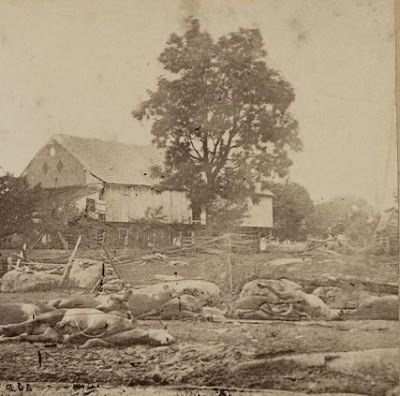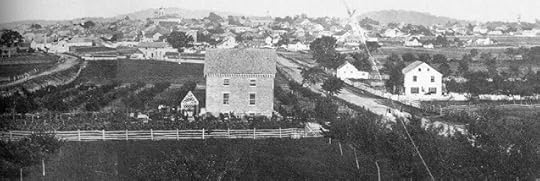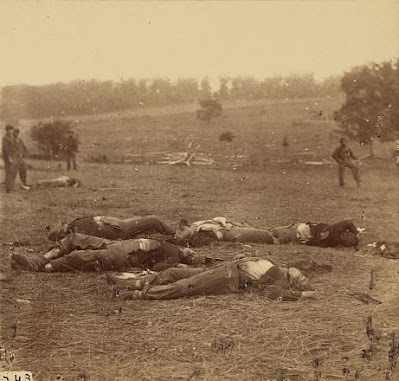War is a Fearful Business: A Civilian Recalls Gettysburg
Dr. Andrew J. Traver of Andersontown, Pennsylvania lived a mere 300 yards from the advance of Jeb Stuart's cavalry in the days before the Battle of Gettysburg. In this extraordinary letter written 9 days after the battle, he describes to friends in Illinois the carnage left in the wake of the costliest battle of the Civil War.
"Over thousands of acres and for miles the ground was covered with dead and dying," he noted. "Broken cannons and caissons, rifles, muskets, knapsacks, cartridge boxes, blankets, hats, caps, boots, shoes, canteens, beef, crackers, and cooking utensils, dead horses, broken ambulance wagons, ammunition wagons, etc., all mixed and mingled in one mass of ruin. In many places the ground was covered with blood and water shoe deep and along the sloughs, the blood and water ran in streams."
"I returned home on Friday [July 10], one week after the battle, and some portions of the field were yet covered with dead Rebels who had not been buried," he continued. "The Rebel prisoners were sent out to bury them but the smell was beyond endurance. Decomposition was so rapid that they would fall to pieces on handling. Hundreds of them were strewn on piles and a little dirt thrown on them. Others were piled in between rocks and thrown in gutters and runs with stones and brush thrown over them with their heads, arms, and legs sticking out."
Dr. Traver’s letter first sawpublication in the July 24, 1863, edition of the Monmouth Atlaspublished in Monmouth, Illinois.

Andersontown,Pennsylvania
July 12,1863
Dearfriends,
After passing through one of the mostexciting and fearful periods of my life, I embrace a few moments of leisure inorder to drop you a few lines concerning matters and things in our locality asregards the great Rebel raid, the desperate fighting, etc. You have had fullparticulars through the press but of the awful realities you know but little.
We have lived one whole week under theadministration of Jeff Davis and from such another week I hope the good Lordmay forever deliver us. The Rebels have ransacked almost every hill and valleysouth of the Susquehanna River and carried off horses, mules, cattle, sheep,wheat, and flour. They have destroyed grain and grass fields, burned fences andbridges, plundered houses, and robbed private citizens of their money andclothes. In many instances they have destroyed women’s clothing and broke theirdishes, destroyed their bed clothes, and in fact, demolished everything exceptwhat they had on their persons. This I have seen with my own eyes and knowwhereof I speak.
This was the case when they first cameinto the neighborhood, but when they found they had to leave, they becamedesperate. Many farmers were entirely ruined. Andersontown was lucky. Stuart’sand Fitzhugh Lee’s Rebel cavalry, 15,000 strong, passed close by us. Theiradvance was up the road about 300 yards from our house. They were making forthe Cumberland Valley to join General Jenkins’ guerillas, but our militia from Harrisburghad driven him up beyond Carlisle and the Rebels hearing our cannons roaring upthe valley and thinking they were cut off, made a hasty retreat to Gettysburg.They burnt many of their baggage wagons in the passes of Round Top Mountain, soyou see how we were saved.
Jenkins’ guerillas were in Lisburn andSiddensburg, but our cavalry from New Cumberland under Colonel Wynkoop were soclose upon them that they had but little time to plunder the country except tosteal horses. The copperheads suffered dreadfully as they did not hide theirhorses. They boasted before the Rebels came that their property would berespected and no Knight of the Golden Circle would be molested. But the poor,deluded creatures were dreadfully disappointed.

I was in Harrisburg for three daysunder arms but I had to fight for nothing and board myself, [page is indistinct].Would go home and act as bushwhackers as Harrisburg was amply defended. I wasas far as Gettysburg and here, oh my God, I hardly know how to describe theawful carnage. Such desperate fighting I suppose had never been known upon the Americancontinent. The Rebels knew that the Confederacy was suspended upon theiractions and the Union army was determined to drive them from our soil, orcapture and kill them at all hazards and this they succeeded in doing to agreat extent.
It will never be known how many Rebelswere killed as hundreds were scattered through the rocks and mountains thatwill never be taken any account of. I returned home on Friday [July 10], oneweek after the battle, and some portions of the field were yet covered withdead Rebels who had not been buried. The Rebel prisoners were sent out to burythem but the smell was beyond endurance. Decomposition was so rapid that theywould fall to pieces on handling. Hundreds of them were strewn on piles and alittle dirt thrown on them. Others were piled in between rocks and thrown ingutters and runs with stones and brush thrown over them with their heads, arms,and legs sticking out. This the Rebels done themselves; as far as our soldiersburied them, they did it with more decency.
But the Rebels appeared to have no respectfor themselves or anybody else. They were so completely thrashed and outwittedat every point that they appear to have given up in despair. Over thousands ofacres and for miles the ground was covered with dead and dying. Broken cannonsand caissons, rifles, muskets, knapsacks, cartridge boxes, blankets, hats,caps, boots, shoes, canteens, beef, crackers, and cooking utensils, deadhorses, broken ambulance wagons, ammunition wagons, etc., all mixed and mingledin one mass of ruin. In many places the ground was covered with blood and watershoe deep and along the sloughs, the blood and water ran in streams.

From my own personal observation, I amconvinced that the Rebels lost two killed to our one on our center and left,and on our right, they lost three to our one. In fact, one what is calledSugarloaf Mountain and along Rocky Creek, I could not find more than 20 of ourmen killed whilst that of the Rebels was from 800-1,000. Our men had piled uprocks into breastworks and the Rebels became frantic at their loss and chargedour works four different times under Longstreet, leaving their dead three orfour men deep in front of our lines. A little farther to the right, thePennsylvania Bucktails charged on Longstreet’s corps and captured one wholedivision.
On the afternoon of the 3rd,General Lee sent a flag of truce asking permission to bury their dead, but thisgame would not work. General Meade was not to be caught with their chaff andsent word back that the dead did not need much attention and that he intendedto fight awhile yet. The Rebels soon after commenced to retreat in disorder,throwing down their guns in utter despair. Many thousands were captured andhundreds fled to the mountains and deserted. Their loss in killed, wounded,prisoners, and deserters will not fall much short of 40,000.
I conversed with many Rebels whoadmitted that Lee brought 120,000 infantry, 20 artillery regiments, and 60,000cavalry over the Potomac, making in round numbers 200,000 men, about 140,000were engaged at Gettysburg. [Dr. Traver’s estimate is off by about a factor oftwo!] The rest were posted at different points between here and Williamsport toguard communications, etc. General Meade has about 150,000 men, but one granddivision did not arrive so that we had scarcely 100,000 men on the field andonly about 75,000 engaged, the rest being held in reserve for any emergencythat might arise.
The balance of Lee’s army had made its way to Hagerstown,hotly pursued by our cavalry who captured a great portion of their baggagetrains and stolen horses. Our cavalry have also destroyed the pontoons over thePotomac. Lee’s army is in a bad fix. Yesterday, heavy cannonading was heard andI suppose another battle was fought on the banks of the Potomac but I have notyet heard the result. For six days, the earth shook from the Potomac to theSusquehanna beneath the heavy firing of artillery. Hanover Junction, Hanover,Carlisle, and Gettysburg were the principal places of conflict.
It has been raining nearly every day since the fighting commencedand I fear that what grain and grass the Rebels left will be spoiled.Everything was neglected during the conflict. What horses were not taken by theRebels were over the river and the grain has been left to rot in the fields.Many of the farmers will not have a bushel of grain or forkful of hay, thearmies having pastured and eaten everything. Truly, war is a fearful business.
But I begin to hope that the rebellion will soon be wound upas the Rebels are beginning to lose confidence in themselves. I talked with avery intelligent officer of the Rebel army who admitted their cause was lost asthey had raised their last army. The whole South was recruited to gather up Lee’sgreat army for the march to Pennsylvania. Their object was to whip our army atGettysburg and then divide into three divisions: one for Washington, one forBaltimore, and one for Harrisburg. By this means, they calculated to counteractthe loss of Vicksburg and the Mississippi Valley which they knew was lost tothem. But they have failed and I think their cause is about lost.
A.J. Traver
To read someother civilian accounts of the Gettysburg campaign, please check out theseposts:
A Civilian's Viewpoint of Lee's Invasion of Pennsylvania
With the U.S. Christian Commission at Gettysburg
On Soil Enriched with Their Blood: The Aftermath of Gettysburg
Dedicating the Gettysburg National Cemetery
Source:
“Letter fromPennsylvania,” account of Dr. Andrew Jackson Traver, Monmouth Atlas (Illinois),July 24, 1863, pg. 2
Daniel A. Masters's Blog
- Daniel A. Masters's profile
- 1 follower



